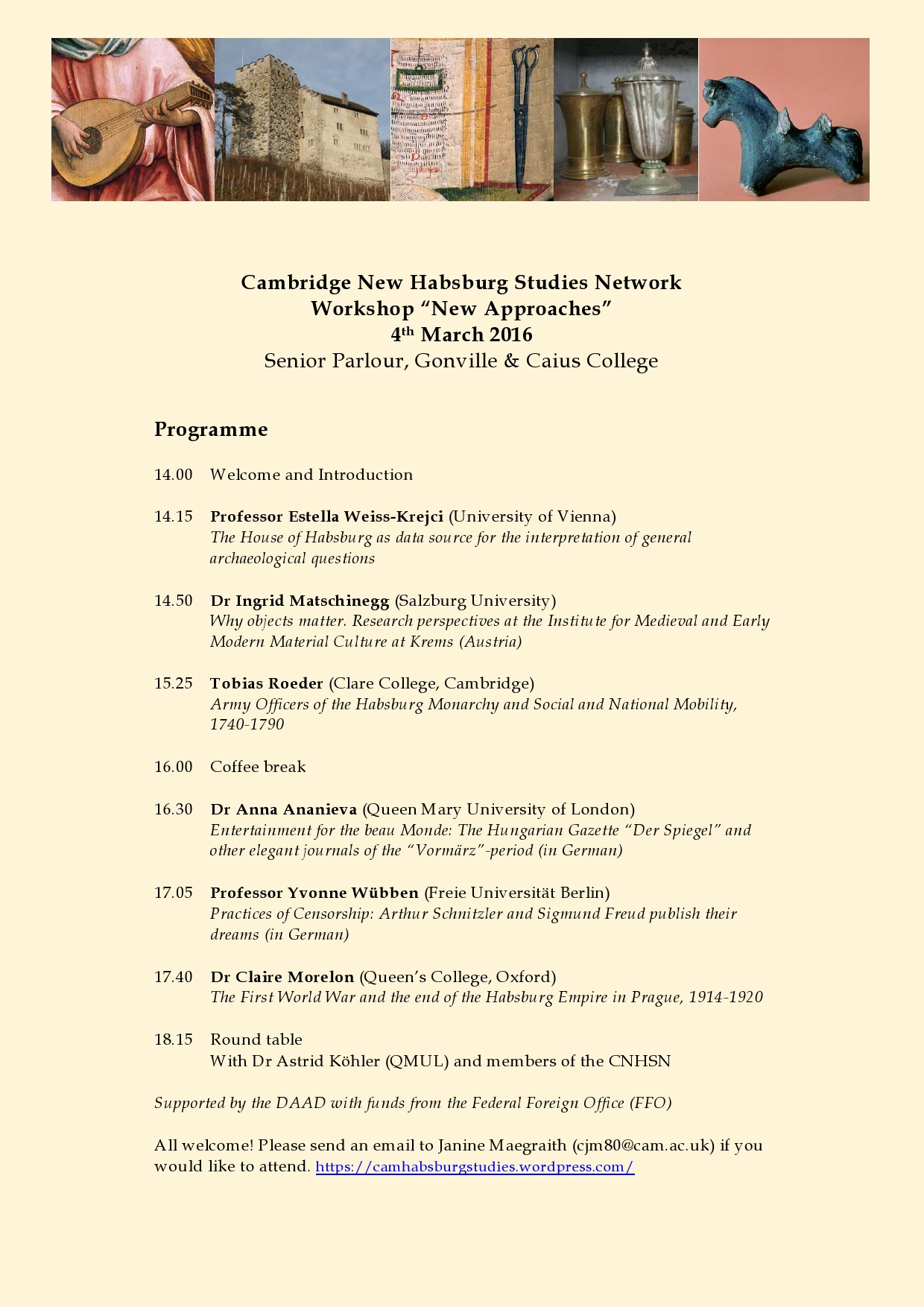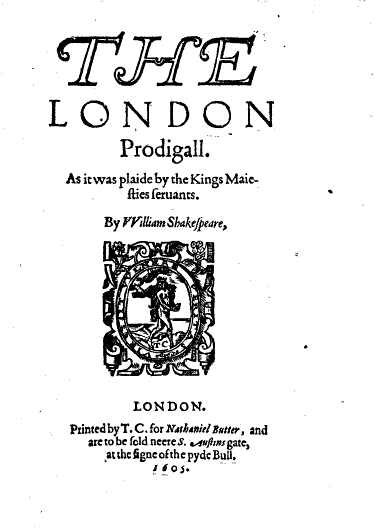 More information here.
More information here.
Tag Archives: Lent 2016
Events This Week
Only one event this week, for the last week of term:
Thursday 10 March
Early Modern Economic and Social History Seminar
5pm, History Faculty, Room 12
Lloyd Bonfield (New York Law School)
Give me your wealthy: Immigration policy in late seventeenth- and early eighteenth-century England
The current immigration debate focuses on the admission to residence and citizenship of those fleeing poverty and civil unrest. But there are also pathways to residence and citizenship that seek to attract a very different sort of migrant: the wealthy. The present debate provides an interesting backdrop for previous ones. This paper focuses on the debate over migration c.1700 which culminated in the short-lived “Act for naturalizing Foreign Protestants“. Although partly inspired by the plight of foreign Protestants, the conversation focused primarily on economic, demographic and legal issues, a cluster of concerns that were absent from earlier debates over immigration.
Events This Week
Tuesday 23rd February
Renaissance Graduate Seminar, 5.15pm, English Faculty GR06/7
Dr Anna-Maria Hartmann (University of Oxford)
Know your Enemy: Stephen Batman, Edmund Spenser, and the Art of Protestant Discernment
Wednesday 24th February
Early Modern Interdisciplinary Seminar, 12pm, SG1, English Faculty Board Room
Richard Oosterhoff (CRASSH, Cambridge)
Idiot wit: framing lay knowers in the Northern Renaissance
Early Modern British and Irish History Seminar, 5.15pm, Graham Storey Room, Trinity Hall
John Gallagher (Gonville and Caius),
Learning Languages in Early Modern England
Friday 26th February
Early Modern French Research Seminar, New Gallery, Whipple Museum, 2pm
Jennifer Oliver (St. John’s College, Oxford):
Congnoistre l’engin de noz ennemys: Machines and Machinations in Rabelais and Beyond
If you would like to advertise an early modern event here please email ab2126.
Renaissance Graduate Seminar
The third Renaissance Graduate Seminar of the term will take place on Tuesday 23 February, at 5.15pm in GR06/7 in the English Faculty:
Anna-Maria Hartmann (Oxford)
Know your enemy: Stephen Batman, Edmund Spenser, and the Art of Protestant Discernment
Abstract
The focus of this talk is the first English mythography, Stephen Batman’s Golden Booke of the Leaden Goddes (1577). Like the other English mythographies, this text has been dismissed as an eccentric, yet derivative copy of more successful continental mythographies. I will show that this assumption is false. The Golden Booke of the Leaden Goddes is a creative manipulation of the genre. It appropriates the mythographical form as well as available concepts of myth in order to address religious anxieties rife in the late 1570s. Once this mythography is restored to its original context, it yields important insights. First, it illustrates ways in which myth was conceptualized and used in the wider culture of the English Renaissance; second, it provides us with new approaches to myth in English poetry. I will demonstrate the potential of English mythography as an interpretative tool by discussing analogies between Batman’s use of myth in the Golden Booke and Spenser’s mythological programme in Book 2, Canto 12 of The Faerie Queene (The Bower of Bliss).
Anna-Maria Hartmann is Christopher Tower Junior Research Fellow in Greek Mythology at Christ Church, Oxford. She received her Ph.D. in English in 2012 from Trinity College, Cambridge. Her research focuses on the reception of myth in the English Renaissance, and she has published articles on this topic in journals such as The Seventeenth Century, Translation and Literature, and Renaissance Studies. Currently, she is completing her monograph English Mythography in Its European Context 1500-1650, and her talk at the RGS is part of this project.
Events This Week
Wren Library, Trinity College, 3pm
Nick Hardy (Cambridge)
Intended principally for graduate students interested in working on early modern Latin texts, this session will introduce some of the research methods that can be used in the study and contextualisation of humanistic printed books and manuscripts. Topics covered will include censorship; coterie and manuscript publication; the reconstruction of humanists’ libraries and the study of their marginalia; and the social, religious and political relationships between authors and other figures involved in the production of books.
Wednesday 17th February
CRASSH (Re)constructing the Material World, 12:30-2pm, SG1, Alison Richard Building
Interiors
Dr Antony Buxton (Tutor in design and domestic history, Department of Continuing Education, University of Oxford)
Dr Ulrich Leben (Associate Curator of Furniture, The Rothschild Collection, Waddesdon Manor)
Early Modern British and Irish Seminar, 5.15pm, Graham Storey Room, Trinity Hall
Aislinn Muller (Girton),
English Catholics and the Excommunication of Elizabeth I: Communication, Resistance and Remembrance
Thursday 18th February
Early Modern European History Seminar, Green Room, Gonville and Caius, 1pm
Katy Bond (Cambridge)
Charles V’s Universal Empire: Fresh perspectives on a costume project, c. 1547
IHR Society, Culture, and Belief, 1500-1800, Past & Present Room (N202), IHR
Hillary Taylor (Yale University)
The affective economy of social relations in early modern England
If you would like to advertise an early modern event here please email ab2126.
Graduate Lecture Series
 Friday 5th February, 1-2pm (GR06/07) ‘Let me honour your repentance’: Financial Excess and Repentance in Early Modern Drama Ezra Horbury
Friday 5th February, 1-2pm (GR06/07) ‘Let me honour your repentance’: Financial Excess and Repentance in Early Modern Drama Ezra Horbury
The early modern prodigal, who finds his ancestor in Luke 15.11-32, is a character marked by excessive expenditure, rebellion, and riot. Most often a youth and almost exclusively male, the prodigal is one of the most popular archetypes in early modern drama. This type appears across scores of plays, such as Quicksilver of Eastward Ho, Young Lionel of The English Traveller, Bassanio of The Merchant of Venice, and both Hal and Falstaff of the Henry IVs. Prodigals were troubling, timely figures that variably reinforced and subverted a range of early modern mores. This lecture examines examples of the archetype at the height of its popularity in the work of Shakespeare and his contemporaries in order to provide students with a preliminary but concrete understanding of prodigals, prodigality, and the social anxieties with which these characters engage.
While prodigal excess is frequently represented as socially disruptive, these plays also demonstrate that it cannot be unproblematically condemned. Excessive trespasses must be forgiven and the prodigal redeemed to restore social order, but distrust concerning the predictable nature of repentance besets these depictions of Christian closure. This lecture also explores the uneasiness present in Calvinist understandings of repentance and opens lines of inquiry for those who wish to interrogate early modern repentance on a broader level.
This lecture will also be of especial interest to those who wish to learn more about dynamics of authority and rebellion in the family, the morality of excess and moderation, and Calvinist thought in early modern drama and culture.
This lecture will be relevant to Part I students taking ‘Paper 4: English Literature and its Contexts, 1500-1700’ and ‘Paper 5: Shakespeare’. For Part II students, it will be relevant to ‘Paper 7: Early Modern Drama 1588-1642’. It may also be of interest to students taking ‘Paper 17: Shakespeare in Performance’.
IMAGE: EEBO, STC 597:06
Renaissance Graduate Seminar
On Tuesday (9th) Dr Vladimir Brljak (University of Cambridge) will speak on Allegorical Poetics in England after 1600: Fishing in the Dead Water. G-R06/07, all welcome!
Dismissed early on as fallow and insignificant by the Edwardian pioneers of the subject, the earlier seventeenth century remains a neglected and misunderstood episode in the history of English poetics and literary criticism – the ‘Dead Water in English Criticism’, in George Saintsbury’s memorable phrase. The talk will challenge this received view and explore more profitable alternatives, with particular attention to the question of the allegorical conception of imaginative literature in the period’s critical thought.
Vladimir Brljak studied at Zagreb (BA) and Warwick (PhD), and is now Thole Research Fellow in English at Trinity Hall. He works mainly on English literary and intellectual history, 1500-1700, with particular interests in allegory, poetics, and the work of John Milton.
Renaissance Graduate Seminar
Lent Term 2016 programme
26/1/16
G-R06/07
Transvernacular Poetry and the Rise of English Literature in Early Modern Europe
Prof. Nigel Smith (Princeton University)
09/2/16
G-R06/07
Allegorical Poetics in England after 1600: Fishing in the Dead Water
Dr Vladimir Brljak (University of Cambridge)
23/2/16
G-R06/07
Know your Enemy: Stephen Batman, Edmund Spenser, and the Art of Protestant Discernment
Dr Anna Hartmann (University of Oxford)
08/3/16
G-R06/07
Shakespeare’s Tailors
Dr Hester Lees-Jeffries (University of Cambridge)



